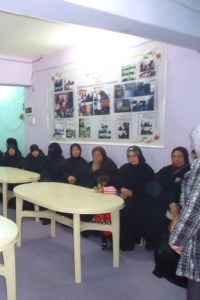
Women-focused civil society organizations estimate that at least twenty percent of the female population in Iraq has either no formal identity or has serious impediments in proving their identity. USAID’s Access to Justice Program educates women and vulnerable groups about their rights and encourages them to use the justice system.
Lamia, born to a poor family living in the impoverished neighborhood of Sadr City in Baghdad, was married at the age of 13. Her family considered this marriage a respite from increasing poverty for the young girl. Due to illiteracy and lack of knowledge, the family settled for a religious marriage performed by a Mullah, as is the general custom among poor and uneducated communities in Iraq.
After nearly two years of marriage, Lamia lost her husband in a terrorist attack, leaving her with no means of earning a living and with a one- year old daughter to support. Life became a struggle to survive for Lamia as she alone at the age of 15 had to care for herself and her child. Her parents and in-laws were unable to help due to their own lack of means. She and her daughter were surviving on one meal per day. Although the Iraqi government provides financial assistance to widows, Lamia was not aware of this and did not have the basic documents required to access a widow’s entitlements and food rations. Her marriage had not been registered in court and thus not recognized by the state.
Not only was Lamia unable to prove her status as a widow, but her child was not able to apply for identification card due to a lack of documentation and was effectively rendered “stateless.” Lamia felt scared for the future of her little girl.
In November 2011, Lamia came across an advertisement of a workshop on “Women’s Legal Rights,” organized by Fatema House, a women-focused civil society organization funded by USAID’s Access to Justice Program. Fatema House is one of many organizations sup-ported by USAID to conduct awareness-raising campaigns that improve knowledge and access of vulnerable groups to their legal rights and services. Lamia, encouraged by the fact that services offered by Fatema House were free, decided to attend the legal awareness workshop.
Lamia learned that, as a citizen of Iraq, she was entitled to special allowances as a widow, as well as compensation offered to families of terrorist attacks victims. She learned that she could access these entitlements provided by the Ministry of Women and the Ministry of Labor and Social Affairs if she had a “Jinsiya,” (identification document) and a marriage certificate to support her claim.
The legal advisors at Fatema House have assisted Lamia to obtain the Jinsiya that enabled her to apply for her rightful benefits and receive monthly food rations from the government. Fatema House is further assisting her in fulfilling the legal requirements for the documents she needs to apply for her other allowances and compensations. Although Lamia still faces difficulties, she is happy to have food on the table and is able to send her daughter to school. Lamia is spreading the word in her community and family about the importance of registering marriages so that others may be saved from the pains that she had to endure.







Comment
Make a general inquiry or suggest an improvement.